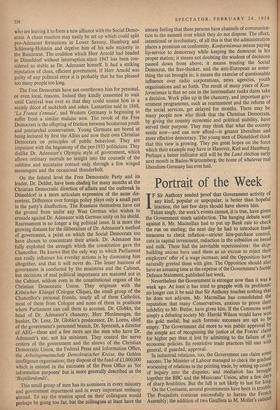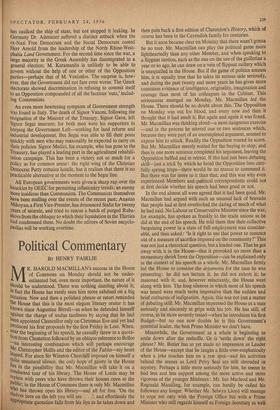Portrait of the Week
IF Sir Anthony needed proof that Government activity of any kind, popular or unpopular, is better than hopeful inaction, the last few days should have shown him. Taken singly, the week's events cannot, it is true, have given the Government much satisfaction. The hanging debate went against it. Mr. Macmillan had to put up Bank rate to check the run on sterling; the next day he had to introduce fresh measures to check inflation—stricter hire-purchase control, cuts in capital investment, reduction in the subsidies on bread and milk. These had the inevitable repercussions : the ship- building unions have used them as an excuse to reject their employers' offer of a wage increase; and the Opposition have naturally greeted them with glee. The Opposition should also have an amusing time at the expense of the Government's feeble Defence Statement, published last week, Nevertheless the Government is stronger now than it was a week ago. At least it has tried to grapple with its problems; no longer can it be said that Sir Anthony touches nothing that he does not adjourn. Mr. Macmillan has consolidated the reputation that many Conservatives, anxious to prove their infidelity to Mr. Butler, have given him. If the Commons were simply a debating society Mr. Harold Wilson would have won the gold medal; but such forensic successes are apt to be empty. The Government did more to win public approval by the simple act of recognising the justice of the Forces' claim for higher pay than it lost by admitting to the failure of its economic policies. Its restrictive trade practices bill met with general, if guarded, approval.
In industrial relations, too, the Government can claim some success. The Minister of Labour managed to check the gradual worsening of relations in the printing trade, by setting up courts of inquiry into the disputes; and mediation has brought together the BBC and the Musicians' Union, after a few days of sharp hostilities. But the lull is not likely to last for long. On the Continent, several governments have been in trouble. The Poujadists continue successfully to harass the French Assembly; the addition of two Gaullists to M. Mollet's cabinet has caulked the ship of state, but not stopped it leaking. In Germany Dr. Adenauer suffered a distinct setback when the ex-Nazi Free Democrats and the Social Democrats ousted Herr Arnold from the leadership of the North Rhine-West- phalia Land Government. For the second time since the war, a large majority in the Greek Assembly has disintegrated in a general election; M. Karamanlis is unlikely to be able to govern without the help of one or other of the Opposition parties—perhaps that of M. Venizelos. The surprise is. how- ever, that the Government did not fare even worse. The Greek electorate showed discrimination in refusing to commit itself to an Opposition compounded of all the factious 'outs,' includ- ing Communists.
An even more heartening symptom of Government strength was found in Italy. The death of Signor Vanoni, following the resignation of the Minister of the Treasury, Signor Gaya, left Signor Segni insecure; for both men were his supporters in keeping the Government Left—working for land reform and industrial development. But Segni was able to fill their posts quickly with men who may reasonably be expected to carry on their policies. Signor Medici, for example. who has gone to the Treasury, has played a leading part in the agricultural rehabili- tation campaign. This has been a victory not so much for a Policy as for common sense : the right wing of the Christian Democrat Party remains hostile, but it realises that there is no practicable alternative at the moment to the Segni line.
All European governments were given a sharp rap over the knuckles by OEEC for permitting inflationary trends; an enemy More insidious than Communism. The Communists themselves have been mulling over the events of the recent past; Anastas Mikoyan, a First Vice-Premier, has denounced Stalin for twenty Years of misrule, and tried to rescue a batch of purged Ruba- &boys from the obloquy to which their liquidation in the Thirties had condemned them. No doubt the editors of Soviet encyclo- ftdias will be working overtime.



































 Previous page
Previous page